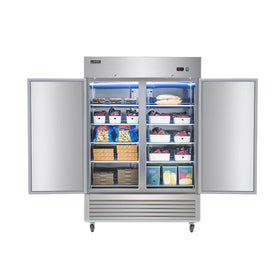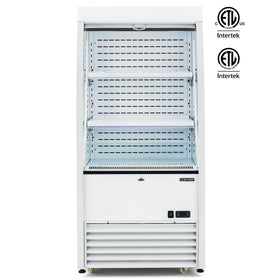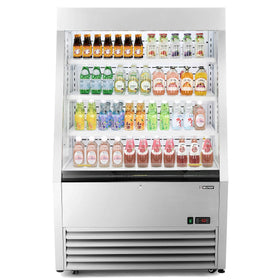All fridges, from a regular home fridge or a commercial refrigerator, make a certain amount of noise during operation. If the noise is occasional, soft, light, or sounds like clicks, it is not a major issue.
However, suppose your fridge is making loud, buzzing noises consistently. In that case, it is likely an indication that something is wrong, and ignoring them can shorten the life of your fridge or lead to costly repairs.
It is not normal for a fridge to make low, repetitive, grinding, or even sudden new sounds and noises, especially if combined with heat, frost buildup, or higher energy bills.
The key is to be able to identify the type of refrigerator noise that indicates a mechanical or electrical issue, and distinguish between normal and expected refrigerator noise.
So how do you tell the difference? And what should you do?

When Is Your Refrigerator Making Noise a Problem?
1. Loud and Constant Buzzing
If your fridge is making loud humming or buzzing noises, it is usually a problem with the compressor or the condenser coils. The loud humming and buzzing could be one or more of the following reasons:
- The compressor is being overworked,
- The condenser coils are dirty and need to be cleaned
- The condenser fan motor is failing.
This can be a bad problem: faulty condenser coils cause cooling issues, and overworked compressors tend to consume more energy and have a shorter lifespan.
How to Solve this Problem
i. Identify and Clean the Condenser Coils
For home fridges, coils are usually behind or underneath. For commercial units, you may need to remove a vent cover to reach the fans.
Then, follow these steps to clean the condenser coils of your refrigerator
ii. For an Overworked Compressor, Fix Airflow, Seals, and Coils
- Clean condenser coils
- Check door seals and replace if leaking air.
- Ensure good airflow: leave 2-3 inches of clearance from walls.
- Check temperature settings, make sure it is not colder than necessary.
- If the problem persists, call a technician.
iii. Call a technician if:
- The problem is with the condenser fan motor
- The problem persists after the above measures.
2. Rattling, Clanking, or Vibrating (not just when the fridge starts/stops)
If the fridge noise takes the form of rattling, clanking, or vibrating, which persists even after the fridge has been running for a while (after being turned on), there is likely a loose component within the unit. It could be any of the following:
- There is a loose panel
- A tube (or some tubes) hitting the back wall,
- The condenser fan is being obstructed
- The motor bearings are failing
What to Do
- For a loose panel, tighten loose screws or clips, and add padding if the vibration continues
- If the tube is hitting the back wall, gently bend or reposition the tubing so it doesn’t rattle. Use foam padding if needed.
- Unplug the fridge, clear away dust, debris, or ice from blades. If it's just cleaning, you can so yourself.
- For a condenser fan motor being obstructed, it is advisable to call a technician.
3. Period Clicking Sounds
If your fridge keeps making loud clicking sounds that are repeated every few minutes, the likely cause is a faulty compressor relay or start capacitor. In other words, your fridge is trying to start (another cycle), but it can't. This problem is usually linked to compressor start-up failure; the fridge may soon stop cooling if you ignore it.
- Faulty start relay or capacitor (most common, inexpensive fix).
- Low refrigerant or pressure issue.
- Seized or failing compressor (major repair/replacement).
What to Do
Call a trusted technician as soon as possible.
4. Metal Grinding Sounds
If the sound from your fridge is similar to the sound of metal grinding on metal, it likely has to do with the fan. Here are some possible explanations:
- The fan motor bearings are wrong
- The fan blades are hitting ice buildups or some other kind of debris
This can be a rather serious problem: If the fan stops, airflow drops, and cooling efficiency plummets.
5. High-Pitched Squealing or Screeching Sounds
If your fridge is making high-pitched squealing or screeching sounds, the likely cause is a worn evaporator or condenser fan motor. The evaporator and/or the condenser fan motor is worn.
This usually gets worse with time and eventually leads to fan failure.
5. Knocking or Banging
Loud knocking or banging noises from your fridge may be an indication of loose internal parts, refrigerant pipes hitting walls, or a failing compressor. If these noises are occasional (like refrigerant expansion), it may be natural, but if frequent and loud, it’s a red flag.
What To Do
Contact a technician. Internal issues require the knowledge and skill of a technician to fix.
6. Hissing or Gurgling with Poor Cooling
Hissing or gurgling sounds from a fridge are usually a sign of a refrigerant leak. Very serious - low refrigerant means poor cooling and possible compressor damage.
If you can clearly hear the noise from another room, or if it suddenly gets louder than you’re used to, that’s a red flag.

When You Shouldn’t Worry About the Fridge Making Noise
If you own a refrigerator, whether it’s a heavy-duty commercial model in a restaurant or the trusty unit in your kitchen, you’ve probably noticed it makes a variety of sounds. A little hum here, a pop or crackle there, even an occasional gurgle.
You can think of these as background noises of a healthy fridge:
- A soft hum or buzz as the compressor runs.
- Gentle gurgling or whooshing from refrigerant.
- Clicks or pops every so often, either from the thermostat turning on and off, or during a defrost cycle.
- Light rattles inside that disappear when you move a shelf or rearrange items.
- Ice maker noises like dripping, filling, or a clunk when ice drops.
In general, if you only notice these sounds when standing next to the fridge, or if they come and go, relax, your fridge is just doing its job.
Troubleshooting Fridge Noises: What to Check First
Before calling a technician, there are a few easy things you can check on your own. Many fridge noises come down to minor issues you can fix in minutes.
1. Check the surroundings
- Is the fridge level? Even a small tilt can cause vibration and rattling.
- Is it pressed against the wall or cabinets? Pull it out slightly.
- Are items inside leaning on each other? Rearrange them to reduce rattling.
2. Clean the coils and fans
- Dust buildup is one of the biggest culprits of buzzing and fan noise.
3. Inspect for ice buildup
- Open the freezer and listen. If the noise gets louder with the door open, the evaporator fan may be hitting ice.
- Defrosting the unit can sometimes solve this.
4. Check the drain pan
- At the bottom of many fridges is a small plastic pan to catch defrost water. If it’s loose, it can rattle during operation.
- If the noise changes or goes away after these checks, you likely solved it.
Home Fridge vs. Commercial Fridge Making Noise: What’s Different?
Home fridges are designed to be quiet. If you notice new loud noises, they’re worth taking seriously because they’re not part of normal operation.
Commercial fridges are naturally louder. Wilprep’s reach-in commercial refrigerators, for example, come with Ebraco compressors and stronger copper fans, which means relatively more airflow noise. But even here, grinding, clanking, or constant loud buzzing are warning signs.
Fixes you can try at home (residential)
- Leveling, cleaning coils, defrosting, and tightening shelves/drawers.
Fixes in commercial settings:
- In addition to the above, regularly clean fan housings (often greasy in kitchens), tighten loose metal panels, and check for blocked airflow from over-stacking.
Fridge Making Noise: When to Call a Technician
If the noise is mechanical, constant, or getting worse despite your checks, it’s time to get help. Specifically:
- Loud knocking or clanking from the compressor.
- Grinding or squealing from fans.
- Continuous hissing/bubbling that seems abnormal.
- Rapid clicking or buzzing when the compressor tries to start.
A technician can diagnose motor wear, refrigerant leaks, or compressor problems-things the average owner can’t fix safely.
When Noise Means It’s Time for a New Fridge
Unfortunately, sometimes noise is a symptom of the fridge nearing the end of its life. You may need a replacement if:
- The compressor is failing (repairs are costly and often not worth it in household models).
- Multiple fan motors are failing, and repair costs add up.
- The fridge is 10–15 years old at home or 8–10 years old commercially.
- Noise continues even after servicing, making the fridge disruptive.
- The fridge isn’t cooling consistently, alongside the noise.
A good rule: If repairs cost more than half the price of a new fridge, replacement is the smarter long-term option.

Final Takeaway
Your fridge will never be completely silent, but it also shouldn’t sound like a power tool in your kitchen or a jackhammer in your restaurant. Soft, occasional sounds (hums, pops, trickles) are healthy. Harsh, constant, or disruptive noises deserve attention.
Start with simple fixes: level it, clean it, defrost it. Call a technician if the problem persists or sounds mechanical. If your fridge is old and noisy even after repairs, replacement is likely the best investment.
And for that, you can go with Wilprep’s brand of reliable refrigerators.
Here is a list of 5 commercial refrigerators you can afford from Wilprep.










